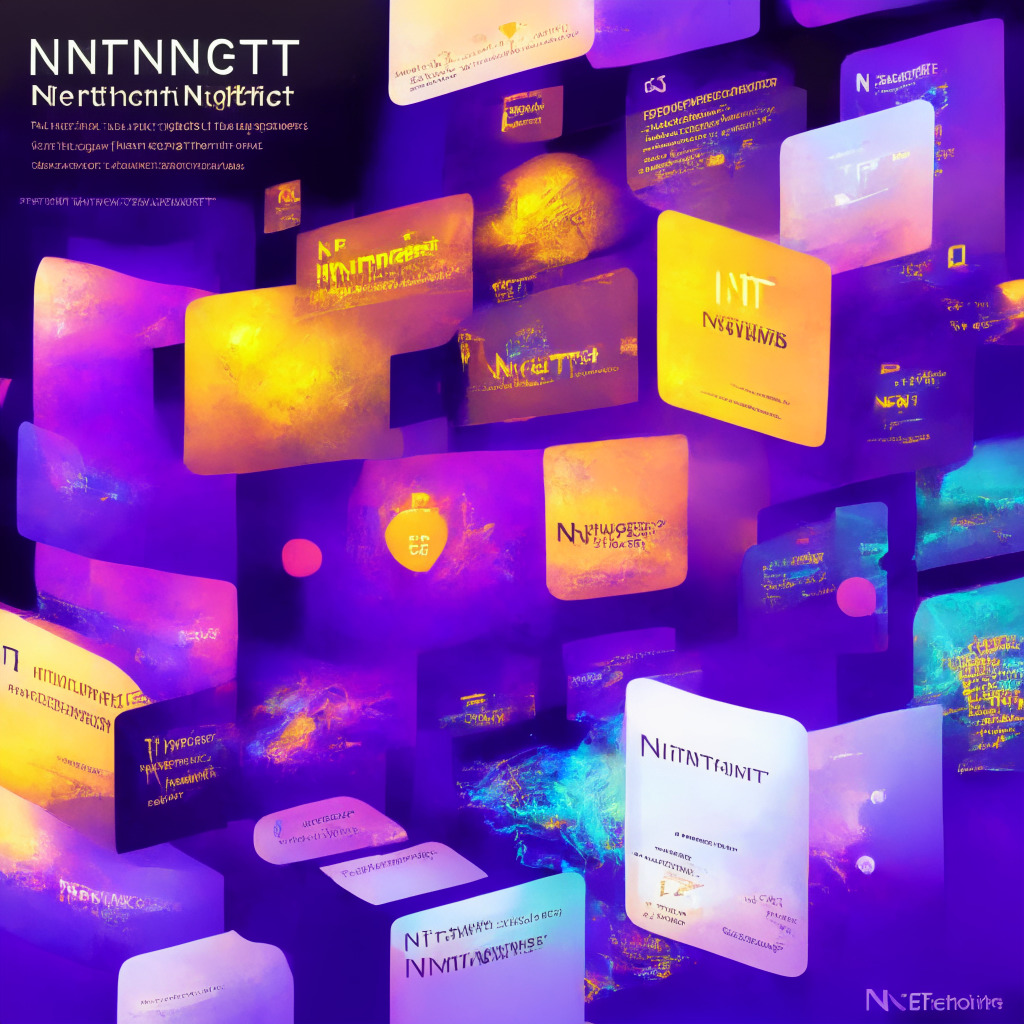Arianee is revolutionizing NFTs for brands like Lacoste and Panerai by offering dynamic NFTs with six smart contracts, enhancing CRM in the Web3 space. Arianee’s platform simplifies NFT creation and enables new interactions between issuers and collectors, ultimately transforming brand-customer engagement.
Search Results for: ape
Binance US vs. SEC: The Clash that Could Shape Crypto Regulation and Innovation
Binance US faces 13 serious charges from the SEC, including operating unregistered exchanges and misrepresenting trading controls. They’ve tapped a high-profile legal team, led by former SEC Division of Enforcement co-director George Canellos. The case raises concerns about striking the right balance between investor security and fostering growth in the blockchain and crypto industries.
SEC’s Aggressive Actions on Crypto Exchanges: Impact on Regulatory Landscape and Future Prospects
SEC Chair Gary Gensler’s aggressive actions against crypto exchanges like Binance and Coinbase could have far-reaching consequences, such as prompting congressional action on crypto regulation and leading to clearer guidelines for crypto businesses. However, uncertainty remains over whether tighter or more relaxed regulation will emerge.
The Mixed Crypto Market: DeFi Surge, XRP Gains, and Concerns in the Evolving Landscape
The crypto market shows mixed outcomes, with Decentralized Finance (DeFi) tokens shifting the traditional finance industry’s balance. BTC and ETH see small losses, while XRP gains 2.01%. Investors should research and understand market trends, considering the volatility of digital assets.
Bipartisan Stablecoin Bill: Impact on US Crypto Landscape, Regulation, and Innovation Pros & Cons
The US House Financial Services Committee released a draft stablecoin bill, aiming to bring clarity on the digital asset market structure and regulation of payment stablecoins. The bill includes detailing primary federal regulators, regulations on issuing payment stablecoins, supervision, enforcement, and interoperability. The proposed legislation gives federal agencies more authority and oversight of stablecoins, as a first step toward regulating cryptocurrency in the US.
AliExpress NFT Mystery, Binance Lawsuit & Hong Kong’s Web3 Boom: Crypto’s Mixed Landscape
AliExpress partnered with Web3 developer The Moment3! for shopping-themed NFTs, but the announcement was deleted shortly after, raising concerns about NFTs’ future in China. Meanwhile, Hong Kong shows increasing demand for Web3 professionals, with pro-Web3 regulations attracting attention.
Exploring Shiba Inu’s Rocket Hub: Impact on Virtual Landscape and $SHIB Ecosystem
The Shiba Inu team recently launched its anticipated Rocket Hub, Game Changer, and Ryoshi Plaza, which aim to transform the virtual landscape and enhance the $SHIB ecosystem. Shib also introduced Game Builder, a user-friendly development tool, enabling unique gameplay experiences.
Stablecoins in a Shifting Regulatory Landscape: USDC’s Potential Advantage Over Rivals
Amidst the recent U.S. regional banking crisis, Circle, the company behind stablecoin USDC, anticipates a more optimistic future. As U.S. lawmakers draft proposals for clear crypto market regulations, Circle’s CEO believes compliance will give USDC a competitive edge over rivals.
SEC Crackdown on Binance: Navigating the Complex Crypto Regulatory Landscape
The SEC’s recent crackdown on Binance and CEO Changpeng Zhao raises concerns over labeling cryptocurrencies like Solana, Cardano, and Polygon as securities. This highlights the complex regulatory landscape that the crypto market is navigating and emphasizes the importance of stakeholders continually educating themselves on upcoming developments.
SEC Actions Against Binance.US Cause Premiums: Managing Risk in an Uncertain Crypto Landscape
Major cryptocurrencies like bitcoin, ether, and USDT are trading at large premiums on Binance.US, indicating deteriorating liquidity amid SEC actions against the platform. Binance.US plans to remove certain trading pairs and pause its OTC trading service to concentrate liquidity and ensure compliance with regulatory requirements. Users must stay informed and vigilant in this dynamic situation.
SEC Actions Impacting Hong Kong Crypto Landscape: Binance and USDT Face Off
Hong Kong licensed lawyer Gilbert NG discusses the potential impact of the US SEC’s actions on Hong Kong’s regulatory landscape for cryptocurrency platforms like Binance. The contrasting treatment of Binance and USDT by the SEC, differing definitions of securities, and established regulatory frameworks in Hong Kong offer distinct approaches to digital asset transactions.
AI Tools Revolutionizing Research Paper Summaries: Pros, Cons, and Top Choices
Blockchain technology and the cryptocurrency market have seen rapid growth, leading to an increasing number of complex research papers. AI tools like ChatGPT, QuillBot, SciSpacy, IBM Watson Discovery, and Semantic Scholar can assist in summarizing and understanding these papers, while serving as valuable starting points for human analysis and critical thinking.
Crypto Market’s V-Shaped Recovery and the Buy-the-Dip Mentality Amid Regulatory Challenges
Bitcoin and the broader cryptocurrency market have experienced a 4% surge despite recent regulatory developments from the SEC. A V-shaped recovery displays investor resilience in the face of regulatory challenges, however, bearish sentiments still prevail. Thorough market research remains essential for unpredictable potential shifts.
Navigating the Crypto Regulatory Landscape: CFTC’s Approach and Balancing Innovation
The CFTC Chair Rostin Behnam dismissed claims of being a “light touch regulator” in the cryptocurrency space, emphasizing the commitment to imposing a necessary regulatory framework adaptable to the evolving crypto landscape. Lawmakers consider legislation clarifying when digital assets are securities and the registration process for intermediaries.
Navigating the US Regulatory Landscape: ICOs, SEC Actions, and Crypto’s Future Challenges
The rapid development of cryptocurrencies has brought regulatory challenges, with U.S. regulators struggling to keep up. As a result, inconsistent enforcement actions have failed to deter Initial Coin Offerings (ICOs) or establish an effective regulatory framework. Crypto platforms’ success may depend on strategically navigating around the U.S. market while focusing on growth opportunities elsewhere.
SEC Lawsuits Against Binance and Coinbase: The Battle that Could Shape Crypto’s Future
The SEC recently took legal actions against Binance and Coinbase for operating unregistered securities exchanges. As lawsuits unfold, SEC Chief Gary Gensler maintains that securities law has been clear for years and intermediaries must comply with regulations. These high-profile cases may shape the future of digital currencies worldwide.
SEC Lawsuit Against Coinbase: Debating Compliance vs Innovation in the Crypto Landscape
The US SEC filed a lawsuit against Coinbase for alleged securities violations, claiming it operated as an unregistered exchange since 2019. As the legal battle continues, skepticism grows over the SEC’s role in providing clarity amidst crucial concerns about balancing innovation and compliance in the rapidly evolving digital assets industry.
Ethereum Superchain: The Optimism Bedrock Upgrade and Its Impact on Blockchain Landscape
Optimism’s Bedrock upgrade aims to improve Ethereum’s usability by reducing gas fees by 40% and deposit-confirmation times by 90%. This significant step towards a “Superchain” could revolutionize the blockchain landscape, providing a more secure and efficient platform for transactions, while facing intense competition from other layer 2 solutions like Arbitrum and ZK Rollups.
SEC vs. Ripple: How Hinman’s Decentralization Views Shape the Future of Crypto Regulation
The SEC’s modification of William Hinman’s biography page has sparked speculation among digital asset enthusiasts, given his relevance in the ongoing Ripple-XRP case. Hinman’s 2018 speech on decentralization and the regulatory classification of Bitcoin and Ethereum may influence legislative proposals targeting the digital assets industry, potentially leading to significant SEC oversight and Safe Harbor provisions for certain projects.
Atomic Wallet Breach: Addressing Cybersecurity in the Growing Crypto Landscape
The recent Atomic Wallet compromises have raised cybersecurity concerns in the crypto world. The platform is working with security agencies, exchanges, and blockchain analytics firms to trace lost funds, highlighting the need for increased safety measures and vigilance within the industry.
Elon Musk’s Dogecoin Lawsuit, AI Chat with Satoshi, and Crypto’s Regulatory Landscape
The article discusses a lawsuit against Elon Musk for alleged insider trading of Dogecoin, the development of a Satoshi Nakamoto AI chatbot, Binance CEO’s thoughts on acquiring a bank, and Crypto.com’s payment institution license in Singapore.
Draft Bill May Reshape Crypto Regulation: Pros, Cons, and Main Conflict
Senior House Republicans introduced a draft bill aiming to establish a concise framework for digital assets in the U.S., allowing regulated crypto firms to argue for commodity classification. The legislation would also introduce digital commodity exchanges with oversight by the Commodity Futures Trading Commission. However, it currently lacks support from Democrats and faces challenges in achieving consensus.
Navigating the Complex Crypto Landscape: Regulations vs. Adoption and Innovation
The reported events highlight the complicated relationship between cryptocurrencies and authorities, with regulators becoming stricter in a growing industry. Despite the uncertain landscape, positive steps towards adoption are seen in governments and the private sector, exemplifying progress and innovation.
Kraken Thrives as Competitors Exit Canada: The Changing Crypto Landscape and Regulations
Amidst tightening Canadian regulatory framework and competitor withdrawals, Kraken sees 25% growth in customer deposits and a fivefold increase in mobile app downloads. Maintaining a strong presence, Kraken ensures client asset safety and commits to third-party custodianship.
StepStone Group’s $96M Blockchain PE Funds: Boon or Bane for Crypto & Investment Landscape?
StepStone Group has raised $96.54 million for two blockchain-focused private equity funds, highlighting increased interest in digital assets and blockchain technology. The funds’ allocation and strategies remain uncertain, raising questions about their impact on the blockchain ecosystem and private equity investors.
FTX Founder Fights Fraud Charges: The Role of Legal Advice and the Complex Crypto Landscape
FTX founder Sam Bankman-Fried faces fraud charges and plans to argue he relied on legal advice from law firm Fenwick & West. His defense requests government documents provided by the firm between 2017-2022 for his case preparation. The case highlights the complexities in the evolving cryptocurrency space and the importance of compliance and transparent communication with regulators.
India’s e-Rupee Advancements: Boon or Bane for the Nation’s Financial Landscape?
India’s Reserve Bank is advancing its efforts in developing a digital rupee, with satisfactory results from two central bank digital currency test projects. Although this initiative holds potential to transform India’s financial landscape, concerns regarding technology, implementation, and security must still be addressed.
Beijing’s Web 3.0 White Paper Unveiled: China’s Edge in Blockchain & Crypto Race?
Beijing’s science and technology government body released a white paper on Web 3.0 innovation and development, supporting advancements in blockchain, cryptocurrency, and related fields. Meanwhile, Hong Kong prepares to launch its crypto licensing regime, while the US faces regulatory crackdowns, potentially giving China an edge in the race to pioneer Web 3.0 technologies.
Exploring MakerDAO’s Proposal to Increase DAI Savings Rate: Implications for DeFi Landscape
MakerDAO community is preparing to vote on increasing the Dai stablecoin (DAI) savings rate (DSR) to 3.33%, which could impact rates across the DeFi landscape. The DSR offers users real-time interest rates by depositing DAI, adjusting stability fees and collateral types.
Gemini and Genesis Battle SEC Lawsuit: Examining the Crypto Regulatory Landscape and User Protection
Gemini and Genesis move to dismiss a SEC lawsuit alleging their Earn product offers unregistered securities. As users face difficulties, conflict between Gemini and parent Digital Currency Group adds to crypto industry’s regulatory uncertainty. Gemini plans a UK base amid growing US regulatory challenges.
Cryptocurrency Market: Volatility, Winners, Losers, and Navigating the Investment Landscape
The cryptocurrency market displays diverse performances with some assets gaining and others facing downturns. Understanding the disparities and crucial factors influencing performance, like market sentiment, helps investors make informed decisions, diversify portfolios, and manage risks in this dynamic market.
Ethereum Exchange Supply Plummets: DeFi, FTX Crisis, and Shapella’s Influence
Ethereum’s exchange supply hits a 5-year low, with only 14.85% held by centralized exchanges, due to factors like the FTX crisis and the Shapella upgrade. This migration away from exchanges is considered bullish, as re-staking reinforces faith in Ethereum’s long-term growth and value stability.































